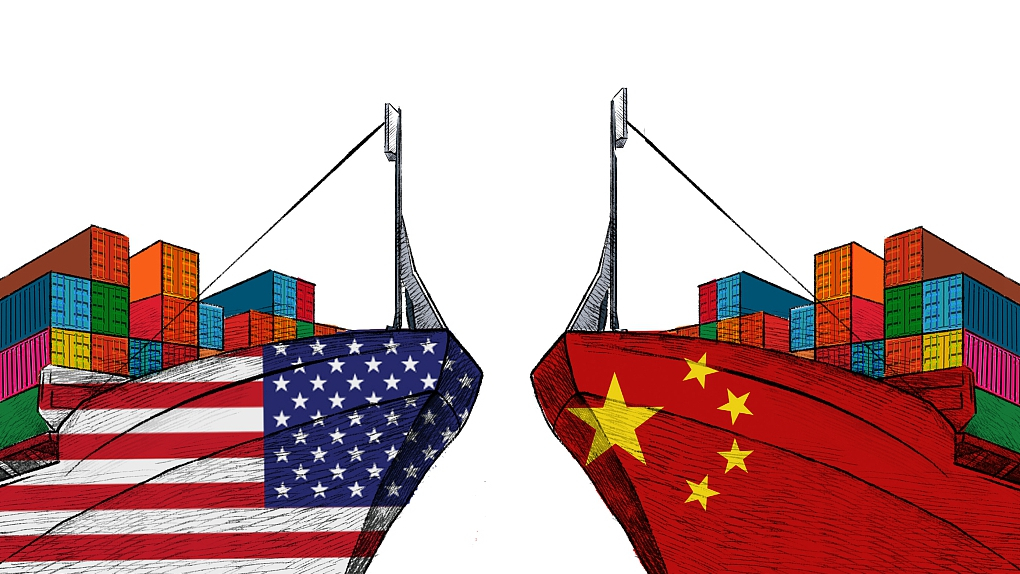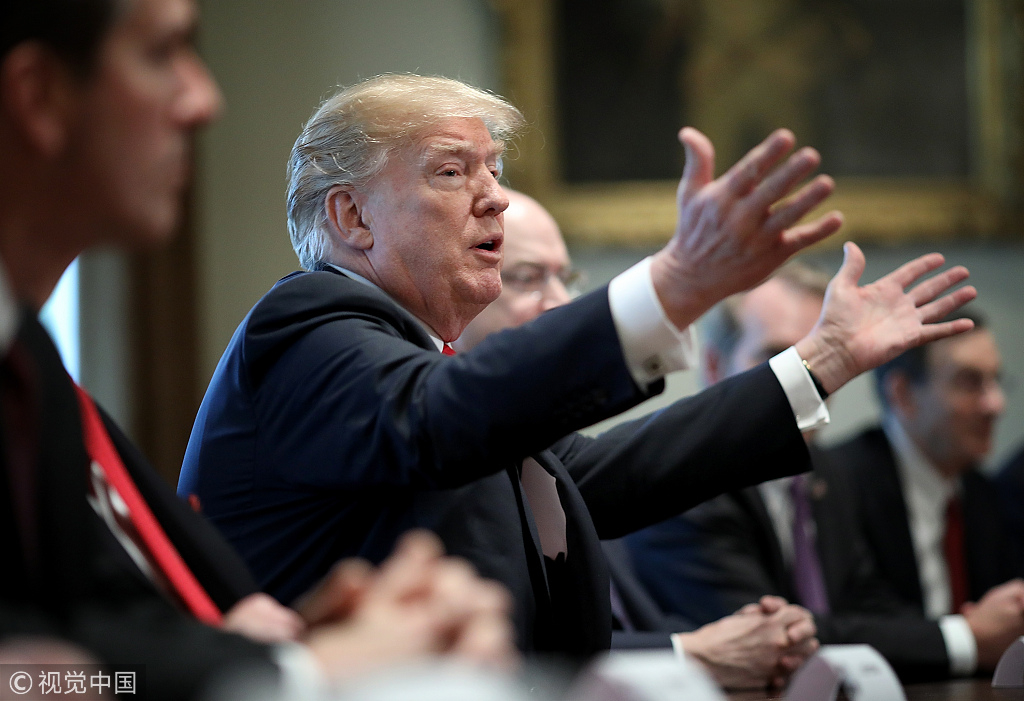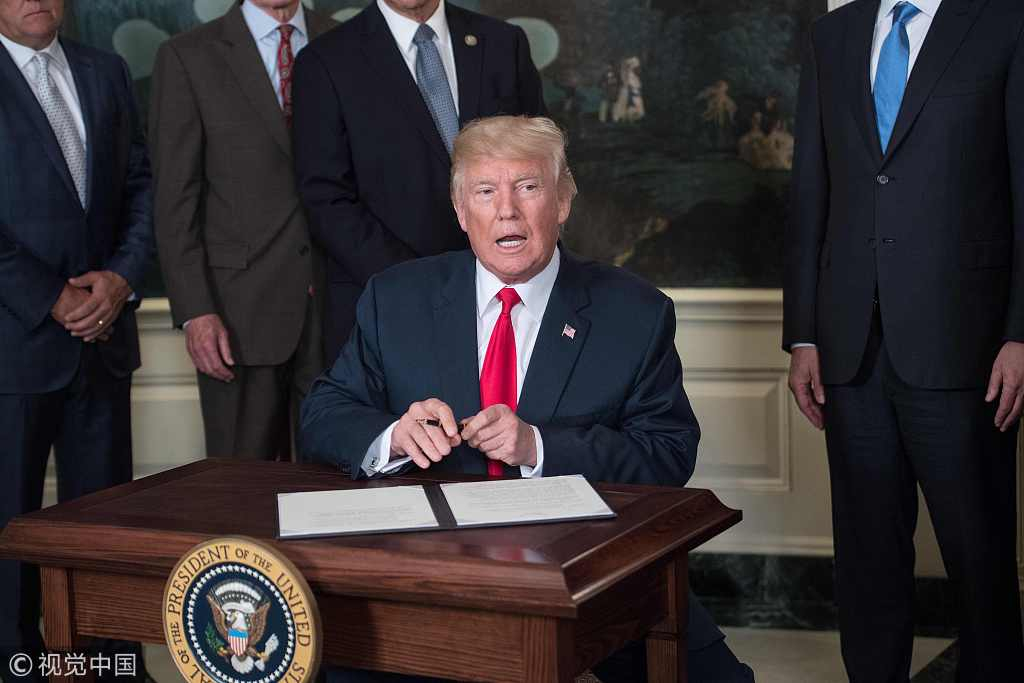
Opinion
17:19, 29-Mar-2019
U.S. should abandon microphone diplomacy in trade talks with China
Updated
18:31, 29-Mar-2019
Bobby Naderi

Editor's note: Bobby Naderi is a journalist, a current affairs commentator, a documentary filmmaker and a member of the Writers Guild of Great Britain. The article reflects the author's opinions, and not necessarily the views of CGTN.
On Friday, China and the United States held ‘positive' talks to resolve an unnecessary spat that has undermined the performance of the global economy.
The meeting between China's top economic official and Vice Premier Liu He and U.S. Trade Representative Robert Lighthizer and Treasury Secretary Steven Mnuchin was the first since China decided to open up its market by putting into law new measures in the high-stakes standoff.
The problem is that negotiations have dragged on for months, substantial differences remain, and here are a dozen realities that we must try to keep in mind while mulling the latest development:
For good reasons, China believes in diplomacy and multilateralism, that's why it has taken steps to address some U.S. complaints. China believes this is the way forward because there is no other option – real diplomacy can yield impressive results. More tariffs and a return to trade war will not help. Even America's European allies are wary of the immense damages caused to their economies because of Trump's trade and tariff wars.

U.S. President Donald Trump speaks during a meeting with leaders of the steel industry at the White House, March 1, 2018. /VCG Photo
U.S. President Donald Trump speaks during a meeting with leaders of the steel industry at the White House, March 1, 2018. /VCG Photo
Apparently, this isn't good enough. Larry Kudlow, the head of the National Economic Council and Trump's top economic advisor, says the trade talks could stretch for months: "This is not time-dependent. This is policy and enforcement-dependent. If it takes a few more weeks, or if it takes months, so be it. We have to get a great deal, as the president says, that works for the United States. That's our principal interest.” This clearly means tensions and rivalry are likely to continue even with a trade deal.
Trump's trade and tariff wars are not hard to understand. They are all about gratification, not “Make America Great Again," or "create American jobs." This is not an odd insistence. All the indications from the past couple of months are that the American negotiators will certainly shift their demands again, changing their positions, walking back previous agreements, preventing a likely deal and causing a new extension. It's easy enough to miss important ones in the chaos.
Here is the rub: With or without a trade deal, President Trump will not lift all the existing tariffs imposed on Chinese imports. While China wants them all lifted if an agreement is reached, Kudlow insists some will have to stay in place. Think about it. The Trumpeters are addicted to tariffs “to assuage their sense of failure and inability to change their behavior” in a multi-polar world. “It's the only relief they can rely on.”
President Donald Trump also says some tariffs should stay in place after a deal is reached to ensure China follows through. This is nonsense. If a deal is reached, all tariffs should be lifted at least on a temporary basis to ensure both China and the U.S. follow through.
The Trump administration should further stop exerting pressure on countries around the world to not use Huawei equipment in the development of next-generation 5G networks. Products produced by the Chinese company present no security risk, and if there is any, the U.S. must provide evidence. Until that happens, Huawei's CFO Meng Wanzhou must be released immediately, and access and legal rights should be granted to all Chinese and Western companies to operate in both China and the West.

U.S. President Donald Trump prepares to sign a memorandum on addressing China's laws, policies, practices and actions related to intellectual property, innovation and technology at the White House in Washington, DC, on August 14, 2017. /VCG Photo
U.S. President Donald Trump prepares to sign a memorandum on addressing China's laws, policies, practices and actions related to intellectual property, innovation and technology at the White House in Washington, DC, on August 14, 2017. /VCG Photo
Although China's Premier Li Keqiang says he doesn't think there is any trust deficit and that both countries should work to prevent one occurring, mutual trust remains a massive work to be done. Irrespective of any trade deal, tensions and rivalry between China and the U.S. over the latter's endless demands will continue to intensify.
China's decision to negotiate and collaborate with the U.S. is to be understood within this context. It's the same rationale that says it is the U.S. and not China that has to abandon its microphone diplomacy and uphold the basic norms governing international relations and treaties. The U.S. cannot renege on its undertakings the moment an agreement is announced.
Let us dispense once and for all: It is said, "sometimes the only way to go forward, or at least know where you are in the present, is to go back.” Trump and his neocon faction are not an exception to the rule of international law, and they shouldn't make this difficult situation awful by staying put.
This costly crisis has been manufactured, and whatever anyone is saying now, it is a fair bet that events would outpace Trump's ill-fated plans and fantasies in the explosive months to come. To avoid this likely nightmare, the best option for the American negotiators is to accept normal rules governing international treaties and trade laws, prepare themselves for a fair deal, and lift all the existing tariffs.
(If you want to contribute and have specific expertise, please contact us at opinions@cgtn.com)

SITEMAP
Copyright © 2018 CGTN. Beijing ICP prepared NO.16065310-3
Copyright © 2018 CGTN. Beijing ICP prepared NO.16065310-3